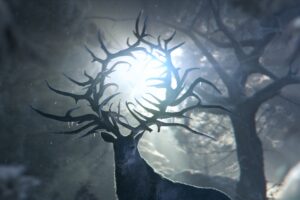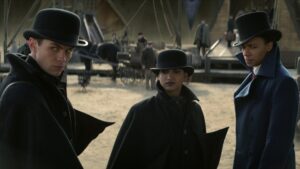SPOILERS FOR SHADOW AND BONE AHEAD!
In yesterday’s review of Shadow And Bone episode six, I probably angered a whole bunch of Malina shippers by suggesting that the couple should be platonic soulmates, so today…I’m about to do it again. I’m sorry! But the ship wars surrounding Shadow And Bone are almost as epic and brutally violent as any of the in-universe conflicts, and none more so than the fight over The Darkling (Ben Barnes), and the nature of his relationship with Alina Starkov (Jessie Mei Li), dubbed “Darklina” by fans: something that episode seven dives into while exploring The Darkling’s origins and agendas in a way that some viewers have criticized for humanizing the villain.

Now, how you feel about this varies from person to person, and I can’t and won’t tell anyone how they should feel about the ship, or make broad assumptions about their character if they do ship it. I can only give you my own reading of Darklina, which, as I mentioned in yesterday’s post, is not something I personally ship. And that’s not an attack specifically on Darklina – I also don’t ship Malina, or Helnik (we covered that one yesterday too), or even one of the Grishaverse’s most popular pairings, “Wesper” – the coupling of Jesper Fahey (Kit Young) and Six Of Crows‘ Wylan Van Eck, who hasn’t even appeared in Shadow And Bone yet.
But purely from a story-telling perspective, it usually makes sense to humanize villains in one way or another: for one thing, it just helps keep the story interesting and engaging. The notable exception to the rule (and even this is not consistent, as I’ll explain) is when a villain is specifically intended to represent some indefensible evil, such as systemic racism, environmental destruction, or capitalism. But while you could make a convincing argument for why The Darkling represents the indefensible evil of abuse, that ironically means humanizing him is more necessary, if anything.
Abusers are often only able to do evil things because of their ability to pass as decent people or even as victims. The Darkling (in my opinion, doesn’t have to be shared by anyone else) is a predator, who subtly nurtures Alina’s insecurities to make her more dependent on him for security and comfort – this is demonstrated when Alina discovers that it was him, working through the Tailor Genya Safin (Daisy Head), who was preventing her letters from reaching Mal Oretsev (Archie Renaux) and vice versa, leading Alina to believe she had been abandoned by her best friend. To me, humanizing The Darkling is essential to understanding not only how he operates, but the full extent of his evil.
Shadow And Bone doesn’t even do a great job of humanizing him for the audience: the episode is frontloaded with flashbacks to The Darkling’s origin story, but these sequences run a bit too long, and could have been streamlined to better explain several major plot-points – including The Darkling’s relationship with the Grisha Healer Luda (Lucy Griffiths), who appears to have been a critical part of his early successes. She is killed off in her first scene, and we never learn more about her, so the emotional impact of her death isn’t felt: even during her short onscreen lifespan, I think most of us were still distracted by Ben Barnes having his Prince Caspian hair back (the wigs in these flashbacks for Barnes and Zoë Wanamaker are…not it).
This same problem comes up again when we watch The Darkling create the Shadow-Fold, something that should have cleared up the entire mystery about why he did so, but doesn’t fully. The explanation, such as it is, is that The Darkling – who was being pursued by agents of the Ravkan king for unspecified reasons – only consciously intended to bend the king’s army to his will: but by using forbidden merzost magic to do so, he unconsciously inflicted upon the world a seething flesh wound of darkness, mutilating Ravka and transforming everyone caught in his hellish outpouring of power into terrible demons.
That’s a decent enough explanation (though different from the books), but in the limited time Shadow And Bone has to explain what merzost even is, the entire concept feels rushed. And given that, in creating the Fold, The Darkling ends up accidentally following his mother Baghra (Zoë Wanamaker)’s advice to create “a problem only Grisha can solve” to win back his prestige, I would have either made that his intention from the start or at least more obviously in the back of his mind while he was using merzost. It’s a pretty brilliant idea because of how it plays into a key theme in Shadow And Bone, which is that victors write the history books, and the Darkling’s had time to craft an elaborate falsified version of events.
The Darkling, after all, is immortal – and “patient”, something he explains to Mal later in the episode. He’s faked his own death and changed his name and persona countless times without mortals ever being able to catch on: but in every life he’s lived in Ravka, he’s also been able to subtly alter and revise the story of the Shadow-Fold’s creation over time, until the “Black Heretic” was an entirely separate person whose real name – Aleksander, the name he still carries in secret – was lost and long-forgotten, and he was merely one of the Heretic’s descendants working to undo his forefather’s crimes.
Ironically, the anti-Grisha bigotry that sparked the creation of the Fold is also erased from history by Ravka itself, as the Fold’s very existence forces the entire country to rely on Grisha for survival and defense (therefore making the rise of modern technology even more threatening to the Grisha). And while most of that is left in subtext for the viewer to conclude on their own (not that it takes a great deal of guesswork), it still helps to inject some conflict into The Darkling’s character arc, giving him a sort of tragic nobility.

But the flashbacks ultimately don’t help flesh out his character as much as his interactions with Alina later, after following her and Mal to the location of Morozova’s Stag – one of three magical beasts whose bones and life-forces act as Amplifiers to a Grisha’s natural power, supposedly only for the Grisha who strikes the killing blow. Alina can’t bring herself to shoot or stab the Stag as it lays dying in the snow, but The Darkling has no such reservations: using The Cut, he brutally decapitates the Stag, slicing its crown of antlers straight off. Alina, now his prisoner, can only watch in horror.
The Darkling doesn’t give Alina any choice when it comes to using the Amplifier – in an intense ritual presided over by Grisha Fabrikator David Kostyk (Luke Pasqualino), he has the Stag’s antlers melded into a small medallion embedded into his own hand, and a multi-pronged collar that becomes rooted in Alina’s spine and shoulders like body-horror jewelry, allowing him to access and harness Alina’s Summoning abilities without her consent. But once that’s done and she’s under his control whether or not she wants to be, then he offers her a chance to rule alongside him – a chance she rejects utterly. Shadow And Bone book fans all got a squeal of excitement out of hearing Ben Barnes say the iconic line: “Fine. Make me your villain”.
The beauty of this line in the show is the added context that The Darkling knows that, whether or not this generation remembers him as a villain, it’ll only take him a few more to change the historical record again. But as book readers know, Darklina doesn’t simply go away now – the romantic connection that Alina and Aleksander shared is something intrinsic to all their interactions going forward, even though Alina is well aware of his strengths as a manipulator and liar. And as Alina herself levels up to challenge his power (something happening much faster in the show than the books), becoming his equal in raw power, the ship only becomes more…shippable.
I know Malinas are extremely overprotective of their ship because they feel they have to be (which is fitting, considering that’s Mal’s defining character trait in the books); and I know Darklinas are defensive of their ship because they get made out to be the villains of the Grishaverse fandom (again, weirdly fitting); so where does that leave us angsty Kanej shippers who are just here for Kaz Brekker (Freddy Carter) doing everything in his power to keep Inej Ghafa (Amita Suman) from quitting the mission without telling her it’s because he depends on her? Somewhere between happy and heartbroken, that’s where.
(And if you ship Jesper with his emotional support goat, Milo (goat), you’re in luck; because Milo returns in this episode and saves the day again, playing an instrumental role in freeing Mal from The Darkling’s prison and setting the entire finale into motion. In return he gets a nice little bit of, like, I don’t know, is that cheese or something that Mal feeds him? “Good with goats” is officially the only thing I look for in a partner, and Mal has passed the test with flying colors).
One thing Shadow And Bone doesn’t have much time to explore in season one is the wealth of material in all three of the Crows’ individual backstories – except for Inej, about whom we’ve already learned a great deal in a very organic manner. In this episode, a single glance from her speaks volumes about the things she suffered while indentured to the brothel owner Tante Heleen, that required her to learn how to patch up wounds while she was still a child. And that’s as much as you need to know. I think there are cases where “tell, don’t show” is acceptable, and, while I’m excited for Shadow And Bone‘s second season to explore Kaz and Jesper’s backstories through flashbacks, it would be difficult to do much more than what’s already been done with Inej.
The Crows already have history together, though, as a team unit – and you can feel it in their iconic motto: “No mourners, no funerals”, which Kaz uses in Shadow And Bone as the Crows board a skiff bound across the Shadow-Fold disguised as foreign ambassadors (and can we just talk about Inej wearing a bowler-hat and suit? Because I feel like we haven’t talked about that enough), having given up on their mission to kidnap Alina – or at least, so Kaz claims. It’s a remarkable coincidence then that they end up sharing the skiff with Alina and The Darkling, not to mention the stowaway Mal, and the Grisha Squaller Zoya Nazyalensky (Sujaya Dasgupta).

As the skiff slips into the haunted darkness of the Fold and everyone’s storylines promise to converge in the season finale, you can’t help but wonder why everyone in the Grishaverse doesn’t have an emotional support goat for times like these (I mean, Alina technically has an emotional support stag, but it’s not very huggable anymore as a result of being dead and headless).
Episode Rating: 9/10